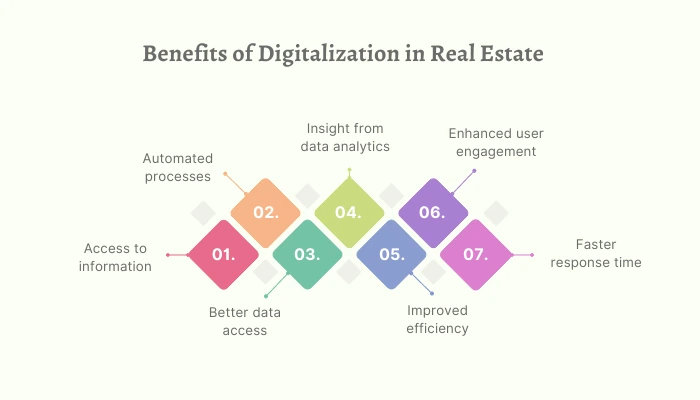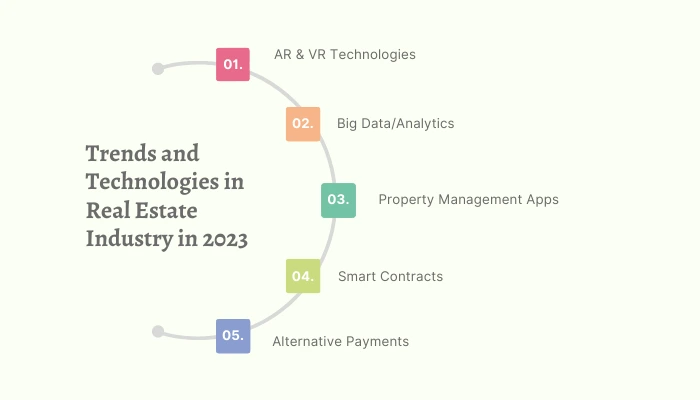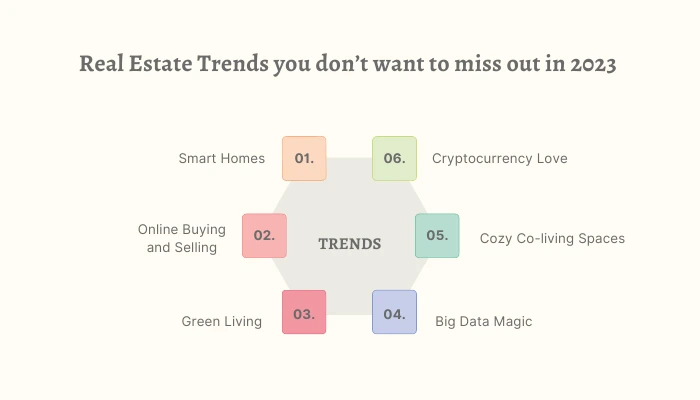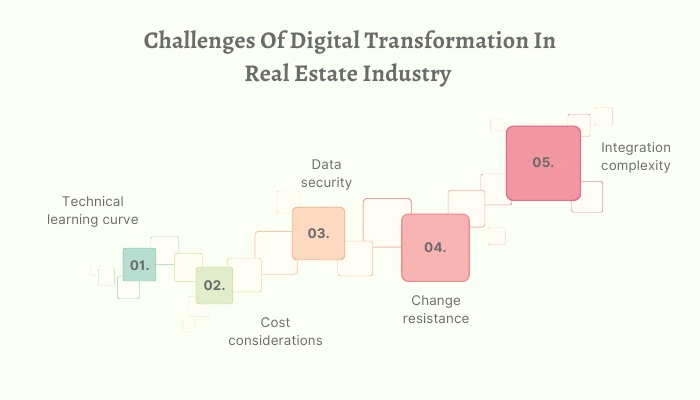“The real estate industry is undergoing a digital transformation, and those who embrace it will be the ones who succeed.” – Mike DelPrete, CEO of Homesnap
The real estate industry is the most competitive industry; the digital transformation in the real estate has completely changed the landscape of the entire industry. It is said to be one of the fastest-growing industries, but when it comes to technology adaptation, it faces some challenges.
The National Association of Realtors stated that 70% of broker associates and 69% of sales agents have a website and have information about buying & selling. Plus, 66% have links to their firm website.
According to the report, 58% of real estate companies have adopted a digital strategy, so to thrive in the real estate landscape you should adopt digital transformation as soon as possible.
With this being said if you are someone who wants to digitalize your real estate business and doesn’t know where to start. Don’t worry we got you covered.
In this blog, we will talk about the benefits of digitalization in real estate and trends and technologies to use in the real estate industry in 2023.
Understanding Digital Transformation in Real Estate

If you want to understand what digital transformation in Real estate is, first you need to understand what is digital transformation.
Simply, digital transformation is changing the entire business processes into digital ones. In other words, adapting digital technology to run the business process.
In recent years, the real estate industry has undergone a major shift and rapid integration of digital technologies. This transformation has redefined the way properties are sold, bought, managed, and even designed.
If you are in the real estate business, you have heard of the website Realtor.com, which helps in selling/renting homes for people. Let’s understand better with some examples.
Virtual property tours
Traditionally, potential buyers had to visit properties to assess their suitability. However, digital transformation has surged virtual tours. The immersive technology such as virtual reality and augmented reality has provided potential buyers with an in-depth exploration of properties without leaving their homes.
Another key development in enhancing virtual property tours is the use of advanced 360-degree cameras and dedicated virtual tour solutions. Platforms like Giraffe360 offer high-resolution imagery, interactive floor plans, and easy sharing options, empowering real estate agents to create immersive online experiences for potential buyers.
By deploying this technology, professionals can present a comprehensive view of properties remotely, significantly increasing buyer engagement and saving valuable time. Integrating such tools demonstrates the growing impact of digital advancements on how agents market listings and interact with clients.
Redfin, a real estate brokerage, reported that properties with virtual tours received more inquiries than those without, highlighting the significant impact of digital engagement.
Benefits of Digitalization in Real Estate

Before wasting further time, let’s delve into these advantages, highlighting how they can be harnessed through tools like best real estate CRM, and others.
Access to information
With just a few clicks, one can access property details, market trends, and even historical data on that property. In this way, the buyer, sellers, and agents make informed decisions ensuring everyone is on the same page.
Automated processes
Digital tools automate processes like appointment scheduling, document signing, and follow-ups. This reduces errors, saves time, and allows real estate professionals to focus on what truly matters.
Better data access
Now gone are the days of sifting through piles of files. Digital platforms centralize data storage, making it easy to retrieve essential documents, contracts, and client information whenever needed. This eliminates the hassle of lost paperwork and misplaced files.
Insight from data analytics
Not only better data access with digitalization real estate professionals can uncover valuable insights about market trends, customer preferences, and investment opportunities.
Improved efficiency
The real estate transformation into digitalization has improved efficiency. With the best real estate CRM, tasks like lead management; client communication and property tracking become seamlessly organized, boosting productivity across the board.
Enhanced user engagement
Real estate website design & development takes user engagement to a whole new level. With interactive features, virtual property tours, and visually appealing layouts captivate visitors keeping them engaged and interested in your listings.
Faster response time
Today, responsiveness matters, Digital communication tools allow you to promptly respond to inquiries, provide updates, and address concerns showcasing your commitment to excellent customer service.
Overall, leveraging tools like real estate CRM, and investing in building IDX real estate websites propel professionals forward, and ensure customer-centric experience.
Why does digital transformation in real estate matter?

To begin digital transformation in real estate matters, but why does it matter so much?
To better understand this question look at the dual perspective.
From a Business standpoint
First and foremost, understanding the importance of digital transformation in real estate necessitates examining it from the business angle.
According to a McKinsey report, real estate companies that undergo digital transformation can expect an increase in annual revenue growth by up to 8%.
From a Customer perspective
Shifting our focus, the value of digital transformation in real estate industry is equally evident when viewed through the lens of the customers themselves.
Moreover, recognizing how this transformation impacts end users underscores the meaningful change it brings to their property experiences
The National Association of Realtors reveals that 93% of homebuyers use online platforms as their primary search source for properties. Another survey by Zillow shows that 73% of sellers would be more likely to list with a real estate agent who uses video to market their property.
However, the future of digital real estate has benefited from both a business perspective and a customer standpoint. From increased revenues to improved customer experiences, the transformational impact of technology is evident and should not be overlooked.
For professionals adapting to the digital transformation in real estate, gaining relevant knowledge and skills is crucial. As technology reshapes how properties are bought, sold, and managed, you may want to consider ways to equip yourself with the online training that fits your schedule. Take a step forward and enroll in real estate classes online to stay ahead in this competitive industry.
Trends and technologies in the Real estate industry in 2023

The technology in real estate transformation has given rise to a myriad of groundbreaking technologies and trends in real estate.
Here, is the list of the top 5 innovations that are reshaping the industry landscape:
AR & VR Technologies
Imagine checking out homes without leaving your couch!
With virtual tours real estate app, you can explore properties through your computer or even with special goggles. It’s like a sneak peek into a place without actually being there.
The marriage of Augmented Reality (AR) and Virtual Reality (VR) has transformed property exploration. Take the example of Zillow, a real estate giant that harnessed VR to offer immersive video home tours.
With features like self-guided property walks and keyless entry, users can experience properties without agents or appointments. The VR real estate market is projected to surge to $2.6 billion by 2025, according to Goldman Sachs research.
Big Data/Analytics
The vast data troves encompassing property details, owners, renters, and agents present an invaluable resource.
Utilizing data analytics not only helps comprehend customer behavior but also aids in providing enhanced services. Moreover, CRM tools, for instance, gather customer insights to facilitate more accurate predictions, elevating customer experiences.
Property Management Apps
With the rise of tech-savvy Gen Z renters, the importance of meeting customers where they are becomes evident. Property management apps serve as a direct channel to cater to their needs, offering swift access to crucial property information.
In a world reliant on mobile apps, this approach aligns with customers’ habits and preferences.
Smart Contracts
The conventional process of closing real estate deals is riddled with inefficiencies. Enter smart contracts, powered by blockchain technology, which streamline transactions through code-based contract conditions. By eradicating middlemen and expediting processes, smart contracts boost efficiency, mitigate fraud risks, and significantly reduce costs.
Alternative Payments
Payment options have become crucial as traditional payment methods evolve. The surge in Buy Now Pay Later (BNPL) solutions, cryptocurrencies, and pay-with-points (PwP) capabilities reflects changing consumer preferences.
Incorporating these alternative payment avenues not only enhances customer loyalty but also opens doors for additional revenue streams.
Embracing these innovative technologies not only defines the future of real estate but also enhances operational efficiency, customer engagement,& revenue generation. As digital transformation continues its journey, staying ahead of the curve with these disruptive forces will undoubtedly shape success in the industry.
Real Estate Trends you don’t want to miss out in 2023

Smart Homes
Homes are getting smarter! Think of lights, thermostats, and security systems you can control with your phone. It’s like having a house that listens to you and does what you want.
Online Buying and Selling
Ever bought something online? Well, houses are joining the party too.
You can now browse and buy properties right from your computer. With more and more real estate businesses investing in real estate agent website development, buying a house become as easy as shopping for clothes.
Green Living
Being kind to the environment is cool, even in real estate. People are looking for eco-friendly homes with things like solar panels and energy-saving gadgets. It’s like living in harmony with nature.
However, sustainability trends are becoming popular even in the real estate industry.
Big Data Magic
Data isn’t just for techies. It’s helping real estate folks too. They’re using big data to predict stuff like which areas might become popular next. It’s like real estate fortune-telling.
Typically, the research tells us, that a high-quality real estate agent that really knows what they are doing will add more to the equation than they cost. Because people make mistakes when selling their own home – the mistakes are costly…” Dave Ramsey
Cozy Co-living Spaces
Living with others is getting trendy. Co-living spaces offer cool places with shared amenities. It’s like having roommates, but fancier.
Cryptocurrency Love
Ever heard of Bitcoin? Well, now you can buy houses with it. Cryptocurrencies are becoming a way to pay for properties. It’s like the money of the future.
So, there you have it – some exciting things happening in real estate this year. It’s like the industry is catching up with all the cool stuff we use in our daily lives. Keep an eye out for these trends and technologies; they might just change the way we think about homes.
Challenges Of Digital Transformation In the Real Estate Industry

The real estate market is expected to grow at a rate of 5.2% from 2022 to 2030, and 41% of real estate companies use technology to redefine their processes. But digital transformation is not all smooth sailing.
Let’s break down some common challenges that digital transformation in commercial real estate is facing.
Technical learning curve
Getting comfortable with new technologies can feel like learning a new language. Real estate professionals may need time to adapt to tools like real estate website development platforms.
On the other hand, a learning curve can slow down the integration process and time & effort are required to master new tools. This could be a challenge for traditional real estate workers.
Cost considerations
While the long-term benefits are evident the initial costs of digital transformation can be daunting. However, the cost is the most crucial aspect of any development process when investing in technologies and training it can strain budgets.
Also, it’s better to consult the real estate agent’s website development cost before investing in one. This is why, finding a balance between cost and benefits is crucial.
Data security
With increased digital interaction comes the need for robust data security. Safeguarding sensitive customer information requires careful planning and investment. Likewise, data security has become a paramount concern.
This is the most prominent challenge that demands attention.
Change resistance
As we have discussed earlier, introducing digital tools can sometimes meet resistance from those accustomed to traditional practices.
However, overcoming this resistance requires effective communication and training.
Integration complexity
Bringing together different digital solutions can become the biggest hurdle & compatibility issues and system integration can slow down the process.
On the same note, integration complexity is a consideration.
Conclusion
Undoubtedly, the real estate sector has experienced a profound disruption thanks to digital transformation. This strategic shift revolves around harnessing novel technologies to enhance processes and elevate efficiency.
As we look ahead, the trajectory of real estate digital transformation is poised for expansion in the upcoming years. Thus, staying informed and engaged with its progress is paramount.
Should you require insights into the realm of digital transformation or seek guidance in crafting real estate solutions, don’t hesitate to reach out. Our expertise as a distinguished real estate app development company makes us your reliable partner in navigating this transformative journey.
FAQ
Digital transformation refers to the integration of advanced technologies like VR, blockchain, and automation in the real estate sector to streamline processes, enhance customer experiences, and drive innovation.
It offers virtual property tours, allowing buyers to explore homes remotely, saving time and increasing convenience. Additionally, smart contracts expedite transactions with secure, automated processes.
Absolutely. Sellers can leverage online marketing, including virtual staging and 3D tours, to showcase properties attractively. Smart analytics enable better pricing strategies, enhancing chances of quick sales.
Data-driven insights guide market trends, customer preferences, and investment decisions. Big data enables predictive analytics for personalized experiences and optimized operations.
It offers easy access to property information, faster responses, and secure transactions. Smart home technologies enhance comfort and security, aligning with modern expectations.
Digital tools streamline property management tasks like maintenance scheduling, rent collection, and tenant communication, reducing manual efforts and minimizing errors.
By embracing innovation, companies attract tech-savvy customers, enhance efficiency, and stay ahead in a rapidly evolving real estate landscape.
No, it’s a fundamental shift shaping the industry’s future. As technology advances, digital transformation will continue to expand and reshape how real estate operates.

Niketan Sharma is the CTO of Nimble AppGenie, a prominent website and mobile app development company in the USA that is delivering excellence with a commitment to boosting business growth & maximizing customer satisfaction. He is a highly motivated individual who helps SMEs and startups grow in this dynamic market with the latest technology and innovation.
Table of Contents




No Comments
Comments are closed.